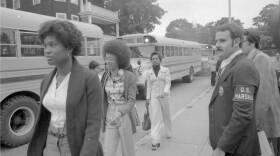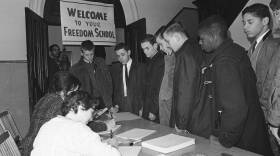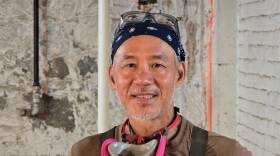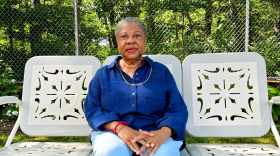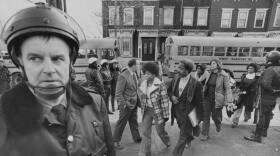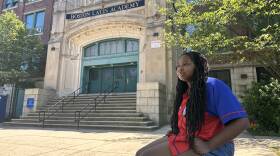50 years later, sisters confront the pain of Boston’s busing crisis
‘Never Cried’: Boston’s Busing Legacy, a short documentary from GBH News, revisits the echoes of Boston’s “busing crisis” and how its legacy of pain still reverberates today.
-
A walking tour of Boston's busing history
This map takes you to historic locations behind the desegregation effort and Boston's busing crisis. -
Children on the Move - The History of Stark Solutions to Address Inequality in Boston Schools
Susan E. Eaton, in conversation about her book, The Other Boston Busing Story: What’s Won and Lost Across the Boundary Line.
METCO, America’s longest-running voluntary school desegregation program, buses children of color from Boston’s city neighborhoods to predominantly white suburban schools. In contrast to the infamous violence and rage that greeted forced school busing within the city in the 1970s, the work of METCO has quietly and calmly promoted school integration. But how has this program affected the lives of its graduates? Would they choose to participate if they had it to do over again? Would they place their own children on the bus to suburbia? In The Other Boston Busing Story, sixty-five METCO graduates who are now adults answer those questions and more, vividly recalling their own stories and assessing the benefits and hardships of crossing racial and class lines on their way to school.
Susan Eaton will be in conversation with Stephanie Leydon, executive producer of digital video at GBH News.
The book talk will be preceded by the screening of the GBH News documentary Never Cried: Boston's Busing Legacy and a talkback with the filmmaker Emily Judem.
More about the film here.Partner:Ford Hall Forum -
The Legacy of Desegregation and Busing: Success or Failure
On this 50th anniversary of busing, how do we take stock of this legacy and what needs to be done now with the Boston Public Schools?
The movement began in the 1960's to improve education for Black students in Boston, but the Boston School Committee refused to make changes and denied Black students were being short changed. The federal court in 1974 found Boston's schools were illegally segregated and then ordered desegregation with busing. There then followed deep racial divisions, turmoil, and white flight from the schools and from the city of Boston.
We hear also about what ways desegregation expanded opportunities for students, teachers, and administrators and the many court orders on hiring of diverse staff, establishing parent councils, bilingual education, university and business partnerships. But the big question is, were the aspirations for high quality education met?
The make-up of Boston schools in 1974 was 60% White, 30% Black, 10% other. The Boston Indicators Project says it is now 45% Latino, 29% Black, 8% Asian, 14% White. So it went from majority white to predominantly students of color school system. The Boston Public Schools were last year not rated well on a whole battery of educational benchmarks by the state's education department. BPS has many challenges to meet now with a more diverse student body, with significant numbers of students who are homeless, those with learning disabilities, and large numbers of recent immigrants whose first language is not English. We will begin to talk about further reforms needed now.
This forum is a collaboration between the BPL and the Boston Desegregation and Busing InitiativePartner:Boston Public Library -
What Happened in the Schools and Neighborhoods When Desegregation and Busing Began
These amongst the most important in Boston’s history forever impacted Boston’s reputation to its residents and to the whole country. It was a cauldron of divisions by race and class and this obscured steps forward that were taken...
Finally in 1972, the NAACP filed a case in federal court on behalf of 14 parents and 43 children that became the Tallullah Morgan vs. James Hennigan case. Judge Garrity ruled on June 21,1974 that the Boston School Committee had segregated the schools and ordered them desegregated.
Busing began on September 12,1974. It was met with fierce resistance from white anti-busing organizations for the next 4 years. This included demonstrations, motorcades, rallies, and electing more anti-busing politicians to office.
Black students integrating white high schools in South Boston, Hyde Park, Charlestown, and Roslindale faced racial epithets, rocks thrown at school buses, and fights started in the schools. This spilled over into the neighborhoods with a number of violent attacks and some retaliations.
Most of the schools did open and remain peaceful. Judge Garrity also ordered many notable education reforms.
Some change started to come when 3 anti-busing politicians lost their elections and the first Black person was elected to the Boston School Committee in 1977.
This is part of a program hosted by the Boston Public Library and the Boston Busing & Desegregation Initiative commemorating the 50th anniversary of Boston desegregation and busing.Partner:Boston Public Library -
50 years after busing, Boston leaders urge reevaluation of desegregation efforts
Fifty years after Boston's court-ordered busing plan aimed to address racial segregation in public schools, the city continues to deal with its effects. Three panelists emphasized the need to shift focus from busing to investing in quality education within neighborhoods. -
In 1964, Bostonians attempted to desegregate schools in city's 'true civil rights movement'
It was a pivotal but often overlooked year for civil rights in Boston sandwiched between two massively influential court cases regarding school desegregation. -
Two sisters confront their trauma from Boston's busing crisis in new GBH documentary
"Never Cried': Boston's Busing Legacy," a short documentary from GBH News, focuses on the story and childhood trauma of Leola Hampton and her older sister, Linda Starks-Walker. -
50 years ago, Chinese students were an underserved afterthought in Boston's busing crisis
Lawrence Wong vividly recalls the fear and apprehension he felt traveling from Chinatown to the Italian North End. -
Boston’s Black educators were fighting their own battle through desegregation
That era 50 years ago was dominated by resentment and isolation within the district, they say. -
50 years after busing, its legacy remains ambiguous and contested in Boston
People who lived through it and have spent time reflecting on it still part ways on what it meant. -
50 years after desegregation order, how do Boston schools teach it?
A student, teacher, an administrator and a nonprofit leader reflect on how Boston teaches its own tarnished history. -
Boston schools desegregation, then and now: through the eyes of a Black student who survived the 1970s turmoil
Education leaders say Boston's next mayor must relieve the pain and restore trust in the school system.
Additional coverage from GBH
-
The Busing Battleground
This American Experience film captures the class tensions and racial violence that ensued when Black and white students in Boston were bused for the first time. -
Pain and Promise: Remembering the Fight for School Integration
American Experience partnered with StoryCorps Studios to record, uplift and archive stories about racial desegregation and educational equity efforts in American schools.





